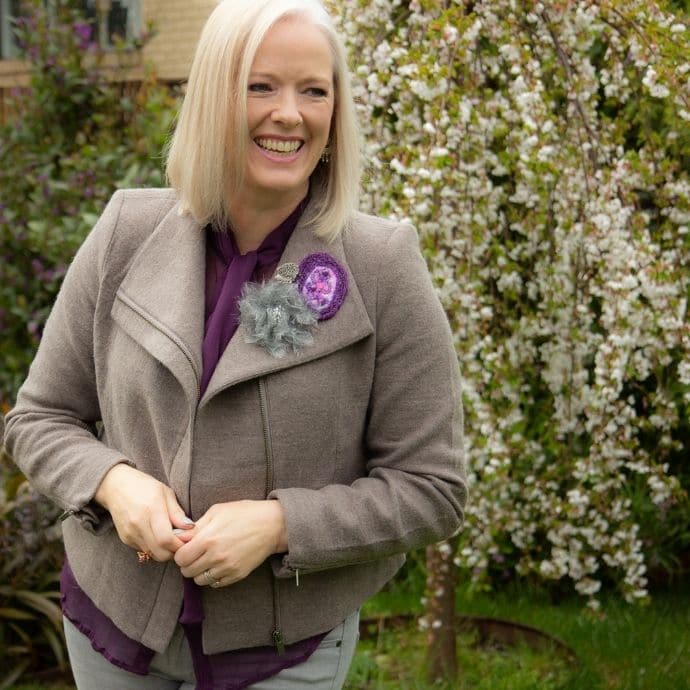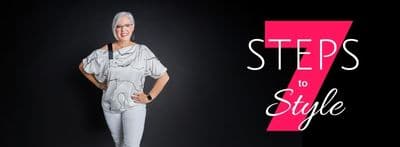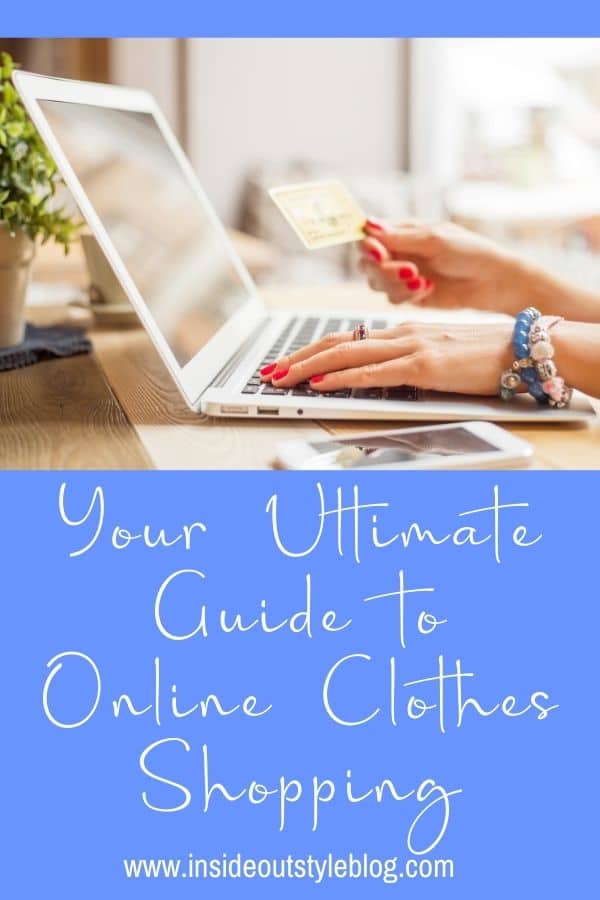- Live a long way from stores? Shop online and have it delivered!
- Want to get something that isn’t available in your location? Find it online!
- Love to find unique and interesting pieces that nobody else is wearing? Online is the way to go.
Here is my ultimate guide to online clothes shopping so that you can have more success with it.
Online shopping is a fantastic invention
That said, it can also be hugely frustrating as online shopping is different to shopping in person as what you are able to experience through your senses is limited.
Visual – you can see the picture – but are the colours represented accurately? What does the fabric really look like?
Auditory – you can’t hear how the fabric sounds when it slides against itself, which happens as you swing arms and walk (and for some people this matters)
Olfactory – you have no idea how the fabric smells. Sounds strange? I’ve picked up a few synthetic fabrics over the years that have terrible chemical smells that have totally put me off wearing them!
Kinaesthetic – how does the fabric feel? Is it pleasant to the touch? Is it comfortable to wear? How does it drape over your body? Is it too lightweight or too heavy for the season you plan to wear it in?
How to Have a Successful Online Shopping Experience
1. Manage Your Expectations
Take those expectations you have that everything you put in your shopping cart is going to be great and lower them …. now lower those expectations some more … and again. I’m serious. Expect NOTHING to fit or that you want to keep it. If you go into your online shopping expedition with this in mind you will have a better time of it.
Remember that there are fashion colours and styles that are currently available both online and in stores. And even if you have an idea that you want to purchase a specific garment in a particular colour, you may not find it as it may not be currently available.
Fortunately, fashions can change quickly and new colours and styles become available. But if you are searching right now and not finding anything, it’s not you, it’s that there isn’t anything out there for you right now! But don’t worry, it won’t always be like this, it could be a few weeks or a few months and everything can have changed.
Expect to NOT buy anything!
That’s right. Really, treat everything that comes to your home as something you DON’T own (it’s just on loan) and try it on. Your home is the changeroom and you are just assessing everything and deciding if you love it or not and then sending back everything if none of it is great enough.
It’s really important to remember that psychologically, it’s easier to let go of something you don’t own, rather than something you do. Think about it like recruiting someone for a job. It’s much easier to not recruit someone than to fire them! Read this post to ensure that you are recruiting only the best items into your wardrobe and making sustainable and conscious shopping decisions that you’ll be happy with for the long term.
Send it back if it:
- Doesn’t fit (and you don’t want to make alterations)
- Not the right colour (and it doesn’t flatter your complexion)
- Don’t like the fabric (in any way, comfort, feel, quality)
- Doesn’t work with at least 3 other items in your existing wardrobe (no point in buying an orphan)
- It doesn’t suit your current lifestyle
- It doesn’t work for the season/location/environment (as much as you may love the garment, if you’ve got nowhere to wear it, don’t keep it)
- You don’t rate it an 8 or higher (read more about this)

This jacket was an online purchase, but for a garment that I’d seen in-store (had already felt and tried on) so I had an experience of it before I bought it (when it was heavily discounted)
2. Easy to Fit vs Hard to Fit Garments and Shoes
What do you shop for online?
If you find it easy to buy tops and almost impossible to buy pants. Then don’t look at pants online, unless you are planning on purchasing 30 pairs from multiple retailers in multiple sizes to try on and being prepared to send all 30 back.
Instead, buy items that have a higher chance of fitting more easily.
These may include items that have stretch in them, are naturally looser fitting or are just things you have more standard sizing for so your measurements are more similar to the garment manufacturers measurements.
If you are less standard (such as large bust, super tall, or petite, need shoes for orthotics etc.) you may want to look at specialist retailers for items that will fit you more easily.
Always buy multiple items of the same garment in different sizes if you’re not sure, and send what doesn’t work back.
Know Your Measurements
Get out a tape measure and take all the measurements you need – shoulders, waist, bust, hips are a great start. Write them down and have them handy to compare to sizing charts.
Now get out your favourite garments and measure them. Things worth knowing are the length of jackets from shoulder to hem, so you can gauge whether the garment you’re looking at is going to be longer or shorter than what you wear.
The length of dresses is also great to know if you’re looking at purchasing a dress.
When looking at a particular garment, find something you have that you think is similar and measure it and compare the measurements given on the website with the ones you get from your garment. Are they similar or different?
Also, consider the fabric -if you’re looking at a stretch fabric garment, there is some ease in the numbers, but for anything woven, try and find garments that are more similar to what fits you that you currently own.
3. Getting the Right Colours
If you have a colour palette that you’re working with (and why wouldn’t you – when it creates harmony with you, just like you like to listen to music that is harmonious and in-tune, the colours that work for you are in-tune with you and your colouring), that makes it easy to have a wardrobe full of clothes that mix and match easily, making every item more versatile. Then you want to make sure that the colours are right for you.
Sadly there is no guarantee that what you see in the photo is the same as what you get. But this is where when you get them home to try on, you can use your colour palette to compare to see if it is in your colour family or not (and if it’s not send it back).
I’ve got 6 tips here on how to get a better idea of colours when shopping online.
Not sure of your colour palette? Get your colour analysis so that you can make sure that you’re choosing the best colours for you.
4. Choosing the Right Fabrics
Get to know fabrics. Yes, there is some research you need to before you go online shopping and start looking at the pretty pictures.
Go through your wardrobe and find your favourite garments that are comfortable to wear, then check the label and note down their fibre content (it’s usually on the label on the side seam with the care instructions).
Then look at garments you hardly or don’t wear, or any that have worn poorly, and figure out what DOESN’T work for you (so you can avoid these in the future).
Be aware that you won’t know what it’s really like til you FEEL it in your own hands. Sometimes you have to get it home and touch it to know if it has a chance of being great or not.
Be wary of garments with more than 3 different fibres in them (I’ve talked about this before here) as they tend to wear more poorly.

This blouse was one I bought online, it was from a retailer I knew well, had easy returns if it wasn’t right, was a loose fit so less likely to have any fit issues plus totally knew it would be in my colour palette!
5. Read Reviews of Garments and Retailers
Read the reviews, read lots of them, there should be information in there about colours, size, fit, fabric, quality etc. This can help you make better decisions about sizing etc when you are purchasing (to try on at home). Read the 5-star reviews with a little scepticism in mind, particularly if it’s a super cheap store and every review says something very similar and basic (these are fake reviews put on there by their staff).
Go to review websites too to check out if the store is legitimate (there are sadly a bunch of dodgy clothing retailers that produce poor knockoffs that you want to avoid).
Product Review Websites to Check Out
You can also read others reviews if you do a little searching online – such as this one.
Plus here is a great list of online stores to stay away from.
Price
If it seems too good to be true, it probably is. If the model looks like a street style blog photo, and there is only one photo and no additional angles of the garment, assume that the manufacturer is taken the photo and the garment may turn out nothing like the photo. If all the photos on the website don’t have the same feel, then they may be stolen from Instagrammers and other shopping websites. This is a good warning sign to stay away! Most legitimate online retailers use the same model in multiple shots, and multiple angles and the feel of the photos is the same.
6. Terms and Conditions of Sale
Payment Methods
What are the payment methods? Unless it’s a well-known brand or store (such as any you’d find in your local mall) look closely at the terms and conditions and payment methods.
Use PayPal for any store that you’re unsure of as they have additional buyer protection as you can easily raise a Paypal dispute and you’ll get your money back. If any retailer that you haven’t heard of doesn’t offer Paypal as a payment method be very wary as it may be hard to get a refund!
Returns
How hard or easy are returns? Look through the terms and conditions and make sure you can return easily and ideally that you won’t have to pay the shipping for returns. Some retailers make it very easy to return with a return back included, or at least a return address pre-paid postage label included along with a form to fill in. Others make it quite tricky, so it’s buyer beware!
7. How to Search for Items
Frustrated about finding what you want? It’s worth changing up your search terms. You can start with a broader term then note down what terms they are using as well (in their description) and become more specific. Try multiple search terms (and think globally not locally too) for example Sweater, Jumper, Cardigan, Pullover may yield better results than just using one of these. Try both Blazer and Jacket when looking for that third piece.
Your search term can also include fabric content – such as Bamboo, Silk, Wool, Cashmere, Linen etc, which are great to use if you’re after a particular fibre. And of course, if you’re after a particular pattern include words like stripe, floral, or leopard print etc.
Do searches on Pinterest (there are lots of links in there to blog posts which may reveal where the item comes from plus to online stores – though do make sure that those stores are legitimate, using the websites in the previous section).
Search on Etsy too, and if you’re looking at something and like the look of it but have questions, it’s easy to contact the seller. You will then get a good idea about customer service and sizing from them (or may be able to request something specific for yourself).
Amazon is also another option that many don’t think about too. It can be worth checking it out as a source of clothing and accessories.
Use Google Image Searches – if you’re after something like something you’ve seen, you can go into Google and upload a photo into the Images search bar and it will find related/similar things.
You can also search by colour as well – say “pink denim jacket” as an example and then see what appears and you may find a retailer with what you’re after is listed in the Google Shopping tab.
Plus ask around, if you’re in one of my style programs Facebook groups you may find that others there know of great resources that you may have never heard of.
Get Your Style Education
If you’re unsure of what silhouettes suit your body shape, which colours flatter your complexion and make you shine and how your personality, lifestyle, and values impact on your wardrobe choices then it’s time to invest in your style education with my 7 Steps to Style program which will teach you what you never learned in school (and what the fashion magazines never told you either) so you can be empowered to define your personal style and make the best shopping choices. Find out more here.
More Shopping Tips Here
















I really only try to buy something that I can return with free return because I do not want to waste my money. That is a reason Amazon is popular, why I will pay extra for something at Nordstrom. I do need to learn to read description better as I have made some mistakes by not being careful with those and having to return things.
http://www.chezmireillefashiontravelmom.com
These are great tips! I have learned to pay attention to the fabrics I like, especially when it comes to fit because the type of fabric will make a difference in how the same size fits in different garments.
These are wonderful tips, Imogen. I much prefer shopping in person because I do want to feel and smell the fabrics and try the garments on before shelling out any cash despite the fact that I can return things. Actually, the only things I really ever buy online are from brands that I know my size or I only buy dresses and shoes online because fit for other things can be a struggle. Thanks for sharing and linking with me.
Shelbee
http://www.shelbeeontheedge.com
Great tips. Unfortunately, so far I have found only one website that accepts free returns AND does not ask what is wrong with the item – youknowwhos.co.uk Like, few times it was just an impulse shopping for me & returned half of the order right away